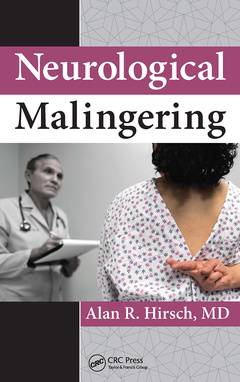Neurological Malingering
Coordonnateur : Hirsch Alan R.

Written from the viewpoint of the practicing clinician, this text is an indispensable addition to the library of anyone who is in the practice of medicine, osteopathy, or chiropractic, as well as for the judge, lawyer, or social worker who may interact with those presenting with the possibility of malingering.
Other topics discussed include Waddell?s Signs, the Pinocchio Phenomenon, the Othello Error, the Menace Reflex, the Reliable Digit Span, Lombard?s Test, the Babinski Sign of the Eyebrow, the Hummel Double Conversation Test, the Swinging Story Test, the Judd-Persaud Test, the Teal Test, the Chimani-Moos Test, the Occlusion Effect, the Drop Arm Test, the Drop Leg Test, the Honest Palm Sign, the Elbow-Flex-Ex Sign, Beevor's Sign, Schober's Test, the Babinski Trunk-Thigh Test, and the Barré Test.
Advance praise for Neurological Malingering
"Dr. Hirsch?s book is long overdue and covers a critical topic of concern to all medical practitioners. This comprehensive treatise is a must for all physicians, psychologists, and others who work with patients who have incentive to gain from the system. Multiple topics related to malingering are presented in 16 straightforward chapters never before compiled in a single volume. I recommend this book highly to anyone concerned about malingering and its impact on the medical system." - Richard L. Doty, PhD, FAAN, Professor and Director, Smell and Taste Center, Perelman School of Medicine, University of Pennsylvania
"Malingering affects not only the malingerers, but the persons and institutions around them as well. As a lay person, the readings have certainly made me considerably more sensitive to suspect behavior. And where knowledge of the underlying condition can affect relationships or transactions one is associated with, it is certainly useful to not only recognize its existence, but also to put it within the context of the challenges that it presents to those relationships or transactions. I count the time spent reading this most comprehensive work as well spent. I would further recommend it to others whose interests, decisions and/or professional pursuits could very well be affected by malingering, whether the behavior is or is not purposeful." - Judge Stephen A. Schiller (Retired), Circuit Court of Cook County, Illinois
1. Malingering: A Historical Perspective
Pouyan Kheirkhah, MD
2. Historical Indications of Malingering
Marissa A. Hirsch, BS
3. Neurological Examination of Malingering
Jose L. Henao, MD, Khurram A. Janjua, MD, and Alan R. Hirsch, MD
4. The Challenge of Detecting Malingering Among Persons with Lower Back Pain
Richard Paul Bonfiglio, MD
5. Malingering: A Physical Medicine Perspective
Jasmine M. Campbell, BA, Chevelle Winchester, BS,Angela Rekhi, BSc, MD, Khurram A. Janjua, MD,Anton N. Dietzen, DC, MD, and Alan R. Hirsch, MD
6. Validity of Waddell’s Sign
Jasir T. Nayati, AAS, CNMT and Ather M. Ali, MD
7. The Electrodiagnostic Evaluation of Malingering
Roberto P. Segura, MD
8. Toxicologic Malingering
Jerrold B. Leikin, MD
9. Pretending to Not Concentrate: Malingering Attention Deficit Hyperactivity Disorder
Angela Rekhi, BSc, MD, Jasmine M. Campbell, BA, and Alan R. Hirsch, MD
10. Detection and Management of Malingering to Obtain Narcotics
Anum Wani, HBSc, Mariam Agha, HBSc, and Alan R. Hirsch, MD
11. Chemosensory Malingering
Alan R. Hirsch, MD
12. Malingering in Geriatrics
Jason J. Gruss, MD
13. Forensic Psychiatric Approach to the Detection of Malingered Neuropsychiatric Symptoms
Carl M. Wahlstrom, Jr., MD
14. Feigning ≠ Malingering: A Case Study
Gregory DeClue, PhD, ABPP
15. Malingering, Noncompliance, and Secondary Gain
Henry Phillip Gruss, JD and Valerie Gruss, PhD
16. Physician Response to Neurological Malingering
Kamran Hanif, MD and Alan R. Hirsch, MD
Alan R. Hirsch, MD, FACP, a board certified neurologist and psychiatrist specializing in the treatment of smell and taste loss, is the neurological director of the Smell & Taste Treatment and Research Foundation in Chicago. He is a senior attending in the Department of Medicine at Mercy Hospital and Medical Center. Dr. Hirsch is certified by the American Board of Neurology and Psychiatry in Neurology, Psychiatry, Pain Medicine, Geriatric Psychiatry, Addiction Psychiatry, and Brain Injury Medicine, and by the United Council for Neurologic Subspecialties ・ Behavioral Neurology and Neuropsychiatry.
Dr. Hirsch conducts in-depth studies of the chemosensory system and its relation to all aspects of life. Some examples include studies observing the effects of aromas on behavior, emotions, mood, and interactions between individuals.
An inventor and investigative researcher in the areas of smell and taste, Dr. Hirsch frequently lectures across the country and has extensively published many of his studies’ findings. He has served as an expert on smell and taste for CNN, Good Morning America, Dateline, 20/20, The Oprah Winfrey Show, CBS Early Show, and Extra. Dr. Hirsch’s expertise has also been utilized by many national and local governmental agencies such as the Illinois State’s Attorney Office, the Environmental Protection Agency, and the Attorney General of the United States.
Additionally, Dr. Hirsch is a member of numerous professional organizations, including the American Academy of Neurology, American College of Physicians, and the American Medical Association. He has served on the Editorial Advisory Board of The International Journal of Aromatherapy, as associate editor of Neurology Healthcare USA, on the Advisory Board of the National Academy of Sports Medicine, on the Medical Advisory Board of the Chronic Fatigue Syndrome Society of Illinois, and on the Editor
Date de parution : 06-2021
15.6x23.4 cm
Date de parution : 05-2018
15.6x23.4 cm
Thèmes de Neurological Malingering :
Mots-clés :
Factitious Disorders; Physical Examination; Secondary Gain; Lower Back Pain; Back Pain; Complex Regional Pain Syndrome; Malingering Patient; Waddell’s Signs; Motor Unit Potentials; Degenerative Disc Disease; Adult ADHD; Multiple Chemical Sensitivity; Prescription Opioids; Spinal Stenosis; Retronasal Smell; ADHD Symptom; Smell Identification Test; Smell Loss; Olfactory Loss; Olfactory Ability; Chemosensory Dysfunction; True ADHD; Olfactory Deficits; Olfactory Bulb; Electrodiagnostic Examination



